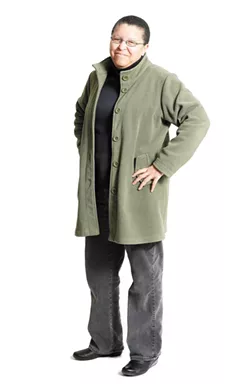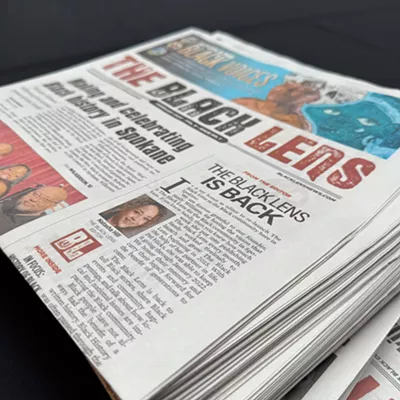Before she started the Black Lens newspaper, focused on issues affecting the black community in Spokane and around the country, Sandy Williams was well known for her work as a community activist.
Her dad's military career originally brought their family to Spokane when she was 12, and after studying psychology and then moving onto a film degree, Williams spent a lot of time between the Inland Northwest and California doing advocacy. She's worked in suicide prevention, in LGBTQ support, with at-risk youth, and in calling out disparities in minority communities.
"You name the oppression, I've pretty much done work in that area," Williams says, "and I keep sort of getting called back into that."
Four years ago, while running Eastern Washington University's Pride Center, she felt called to start the Black Lens, which she writes, edits, designs and sells ads for all on her own. She also distributes all 1,400 copies, with about 250 subscribers getting issues mailed to them around the country.
INLANDER: You had done film before. Was some of that journalistic in nature, or is this totally brand new to you?
WILLIAMS: No, I had no journalism background whatsoever, except storytelling. I've always been a storyteller from the time I was a kid. I was always writing stories and poems. I was not a talker. I was a very withdrawn, quiet kid, so I wrote a lot. ... I think even the narratives of my paper I would argue are more storytelling than journalistic. I'd argue that's more of my bent.
I tell people, you know the newspaper for me was just another form of activism. Same as I did a radio show here on KYRS for a while. That was activism. Everything is through that lens of activism for me.
Why did you choose to focus specifically on the African-American community around here?
Because it needed it. You know, that's my people.
We moved here when I was 12, so even though I've left a couple times, I still have a long history of knowing the people, knowing the issues, knowing the community, and there has just always been a need for a mechanism of communication. There had been a newspaper in the '90s called the African American Voice ... and that paper lasted I think three, four, five years, something like that, and went away.
So from the '90s there was nothing, and I mean it's the 2000s already and there's like no black newspaper, there's no black radio, there's no black part of town, there's like no black anything, except for churches. So you know there was lots of conversation about the need, but there was just no avenue for somebody to sort of step into that, or kind of have an understanding of how to do that.
Are there things you've covered that you feel like the rest of Spokane media still have pretty much missed the ball on?
I think racial disparities in general. I think Spokane doesn't like to talk about that. We do a lot of surface stuff, and I would toot my horn a little, because I think the fact I keep bringing it up is forcing other media to address it more.
You know the other thing is, like, I don't do a lot of sports stories. Not because I don't think sports are important, but it's like in Spokane that's the only time you ever hear about black people, is when they're athletes. I think that's valuable, but I intentionally don't cover that. ♦

























